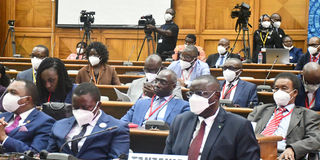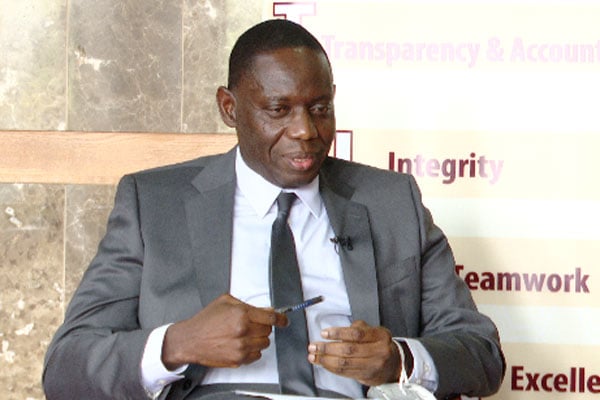Prime
Tackling ESG: The new big deal in boardrooms

People in a meeting. Companies are also expected to ensure human rights and labour protection practices within their organisational culture. PHOTO | EDGAR R. BATTE
A celebratory mood filled the air at an evening dinner for the American Tower Corporation.
The dinner held in early July in Kampala attracted the elite class in the telecommunications sector. But, in between a flash of cameras and popping champagne at Kampala Serena Hotel to celebrate a decade of long service.
It was also a defining moment for the industry’s top chief executive to reflect on what the next decade would be.
Dorothy Ssemanda, the American Tower Corporation chief executive, took to the podium to announce how the company was shifting to solar energy and lithium ion batteries.
This shift to more green energy sources, according to Ssemanda, could help the company operate a fleet of its 4,000 wireless and broadcast towers and masts spread across the country.
“Many of our sites currently at least in Uganda rely on diesel generators [for back up]. Because of that, we have a high carbon footprint, but this has been reducing over time by moving to cleaner sources of power such as solar power, lithium ion batteries which stores power for longer periods,” Ssemanda said.
At the back of this major shift to green energy is the increasing global pressure.
A pressure to have companies adhere to the Environmental, Social and Governance (ESG) agenda.
Chief executives are facing a test of time. Most, if not all, are expected to fit the ESG agenda in their long term business strategic plans and budgets.
Judy Rugasira, the managing director at Knight Frank Uganda, says the ESG criteria focuses on companies making commitments to deliberately integrate their operations and products with pro-environment and climate solutions.
Companies are also expected to ensure human rights and labour protection practices within their organisational culture.
Overall, building a strong, equitable and transparent governance structure is also expected.
ESG aspects are emerging as core values of companies, major financial institutions and shareholders around the world.
The United Nations considers ESG as a significant element that consumers, businesses, and civil societies will look up for in a product, and the demand for ESG management is ever-growing.
The UN in its Sustainable Developments Goals (SDGs) requires that companies should have a reflection of social and ethical values and eco-friendly sustainability.
That is, if they are making investment decisions in a company.
For now, the ESG criteria remains a trending topic both globally, and in Uganda.
Rugasira says the ESG criteria will play an increasingly vital role in investment decisions moving forward.
This is backed on growing expectations from investors, occupiers, and employees and the increasing emphasis on green development strategies.
In the real estate market, such assessments according to Rugasira must take into account factors such as the social and community benefits a building possesses, and the nature of tenant operations.
It is also inclusive of assessing environment-based aspects such as carbon emissions, energy and utility management, external lighting, waste management, and technology use.
The shift to more climate smart buildings will require investments into systems such as LED lighting, motion sensors, and efficient heating and air conditioning systems.
“In developed markets, ESG-driven tenants are willing to pay a rental premium for a building that is compliant,” Rugasira says.
While Uganda is still in the nascent stage of the ESG adoption, finance and banking institutions have become the front runners in the adoption of the criteria.
Some are developing strategies to provide financing for sustainability-driven investments and businesses.
“With continuous parallels drawn between the unforeseen risks caused by the pandemic and the climate crisis significantly affecting the global economy, it has resulted in a need for greater investment and progress on matters relating to ESG by both investors and policy makers,” Rugasira notes.
Rugasira observes ESG is already attracting the attention of lenders and other property stakeholders.
This may affect prospects of rental and capital growth and would, as a result, influence investment approach.
With the notion of ESG still in its infancy in Uganda, Rugasira observes that property deals are yet to reflect a measurable ESG premium on yields and rentals as is the case in other countries.
“With the increasing requirement for ESG compliance by occupiers and other sector players particularly multinationals world over, it is likely to be key in future property transactions in Uganda,” Rugasira explains.
Tough road ahead
It remains a balancing act for some financing institutions for the call towards the ESG agenda.
Some look at it as a risk, and an opportunity. In a published interview in July, Micheal Atingi- Ego, deputy governor at Bank of Uganda told Daily Monitor that the Central Bank is planning to have a conversation with the supervised institutions on how they are implementing the ESG framework.
However, the challenge the governor noted is, “each institution is playing its own game based on their parent company’s mission.”
“We want to enforce uniformity on how these commercial banks deal with the three Ps - Profits, People and Planet,” the deputy governor said.
ESG has largely been pegged on emission reduction efforts for companies that aim to achieve the Carbon Neutral status under The Carbon Neutral Protocol.
This is aligned to net-zero and the 1.5oC scenario of the Paris Agreement.
Some financing institutions are cautious as Africa remains highly vulnerable to climate change impacts under all scenarios.
The Intergovernmental Panel on Climate Change (IPCC) made this assessment. Standard Bank Group, with affiliates such as Stanbic Bank in Uganda has expressed caution in its report on Standard Climate Related Disclosures for 2021. The group indicates that the transition raises the group’s lending exposure to clients associated with the non-renewables such as coal and oil.
This is giving rise to client-related transition and stranded asset risks. This transition has the potential for extensive policy, legal, technology and market related changes and costs attached to transitioning to a lower carbon operating model.
“We recognise that these risks in turn could impact the creditworthiness of our customers and their ability to repay outstanding exposures,” the report reads in part.
This transitional risk largely arises from uncertain long-term demand for non-renewable energy sources, especially coal, owing to regulatory changes and associated risk of stranded assets. This therefore leads to a financial risk stemming from loss in value of clients’ assets and collateral resulting in increased risk of client default and the non-viability of their businesses.
Besides, the risk also falls on the evolving technologies that are designed to meet the transition to a lower emissions and energy efficient future. This has been predicted to render the business models of some of our customers uncompetitive, leading to reduced demand for their products and services.
The financial market risk for the banking sector is viewed from the changing client expectations, as clients seek greener solutions and more transparency, impacting on business opportunities.
Opportunity in crisis
Financiers view the ESG agenda in a positive light providing an array of opportunities to product offering.
For instance, Standard bank makes sense of an expanding market to finance green product offerings for retail clients such as loans for solar solutions, green buildings and climate smart agriculture. This means as financiers continue to increase the proportion of the energy loan book committed towards green energy. This will also correspond to the decrease in the proportion of finance committed to non-renewable energy.
The aviation industry like other businesses are being encouraged to develop ESG strategies as part of the industry’s commitment towards its Net Zero 2050 target.
The International Air Transport Association (IATA) is leading the industry.
Linden Birns, an aviation industry consultant at Plane Talking says the Airlines Association of Southern Africa (AASA) is developing a regional environmental strategy to support its members with their ESG strategies.
Companies will need to dig deep into their pockets to implement the ESG agenda, but even so, Ssemanda observes that environmental protection comes at a cost.
“It will remain beneficial to the sustainability of the company business, and fits into our model into a long term sustainable investment,” Ssemanda sums up.




